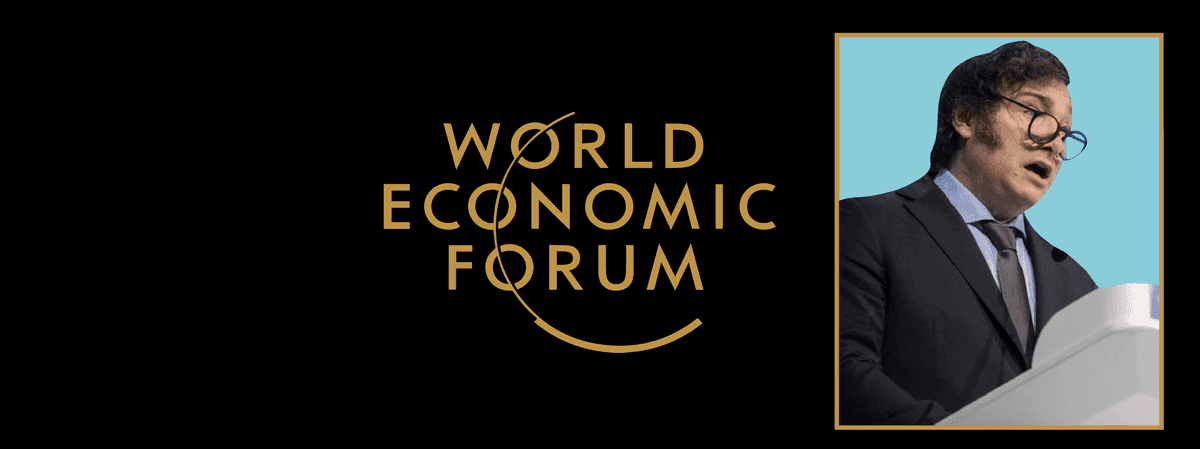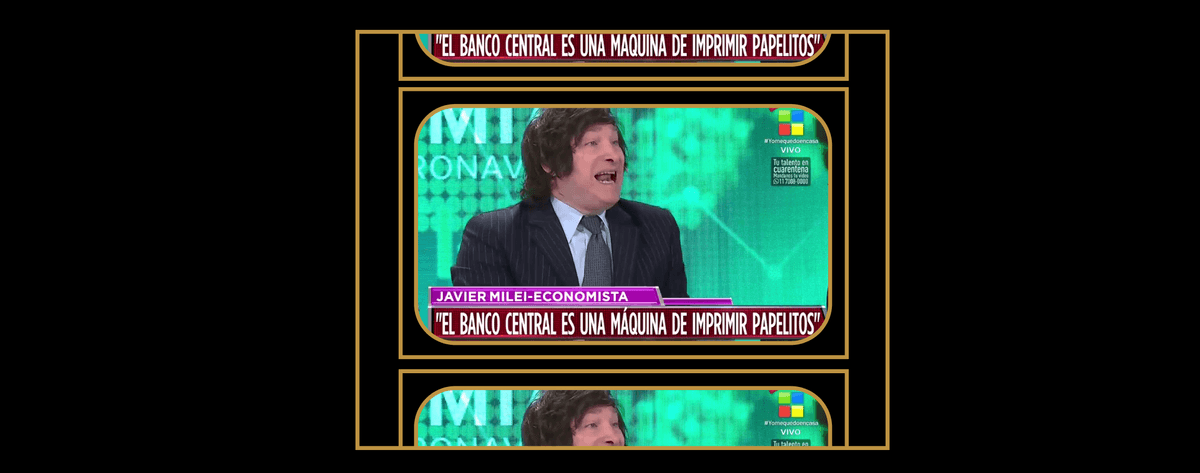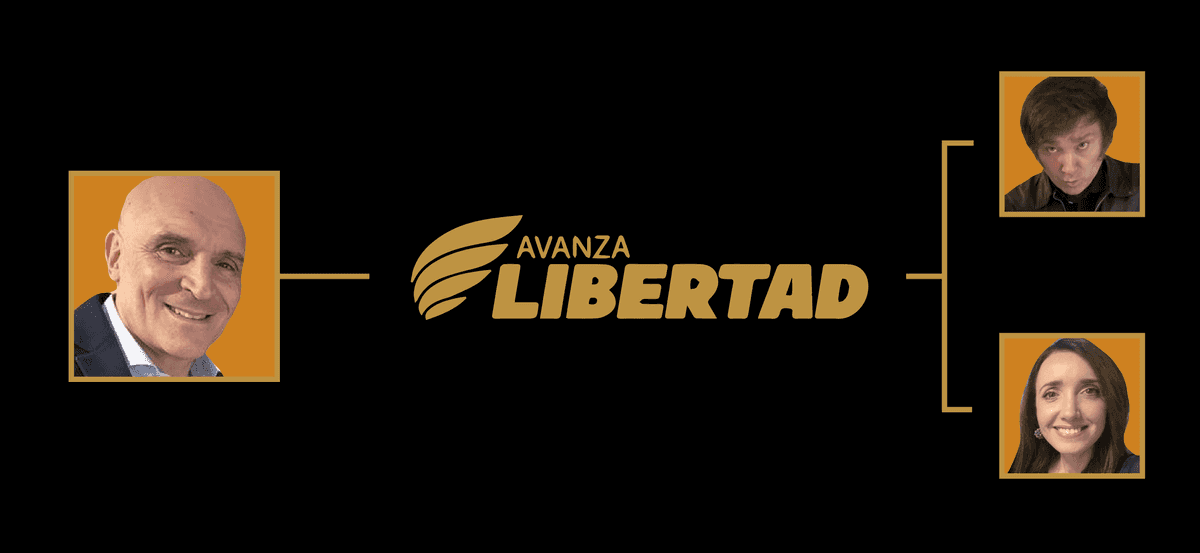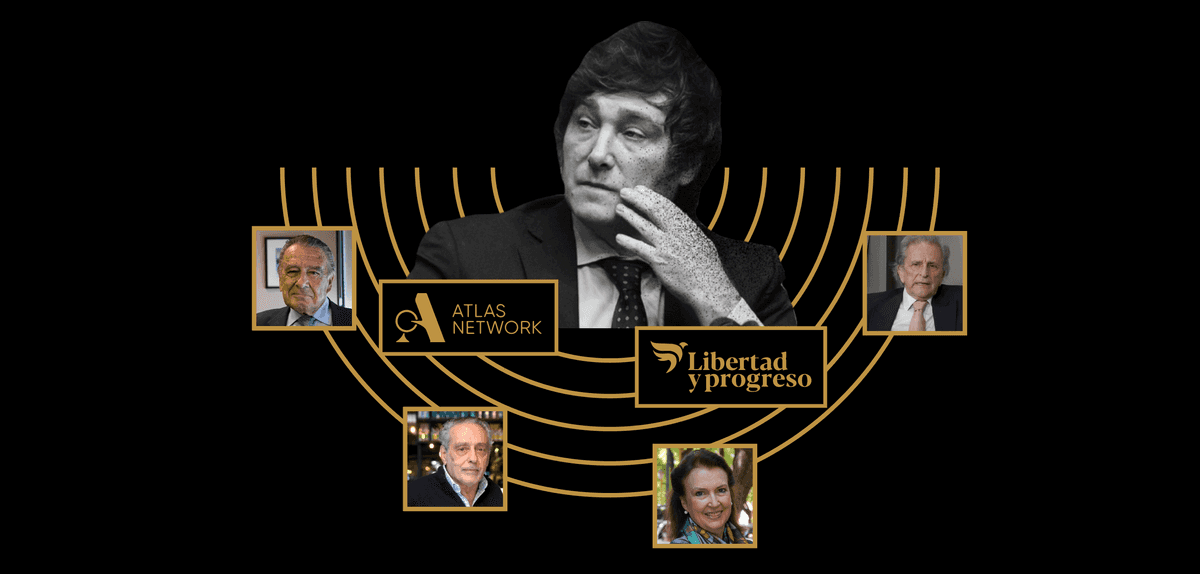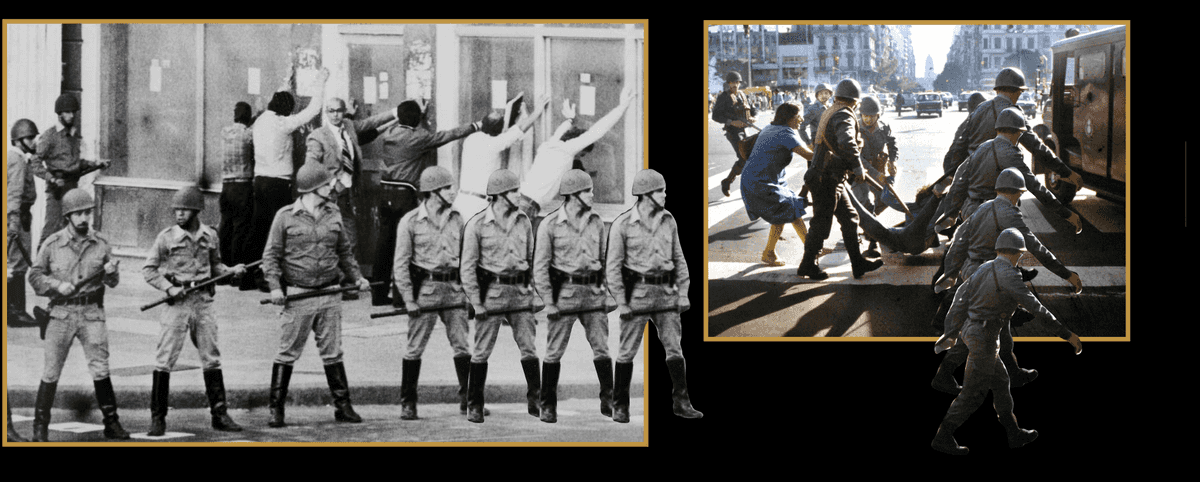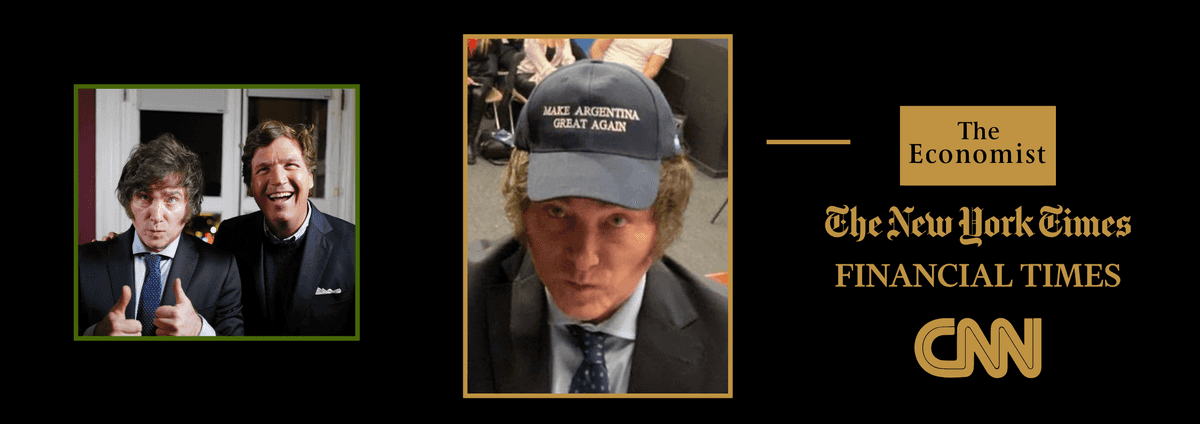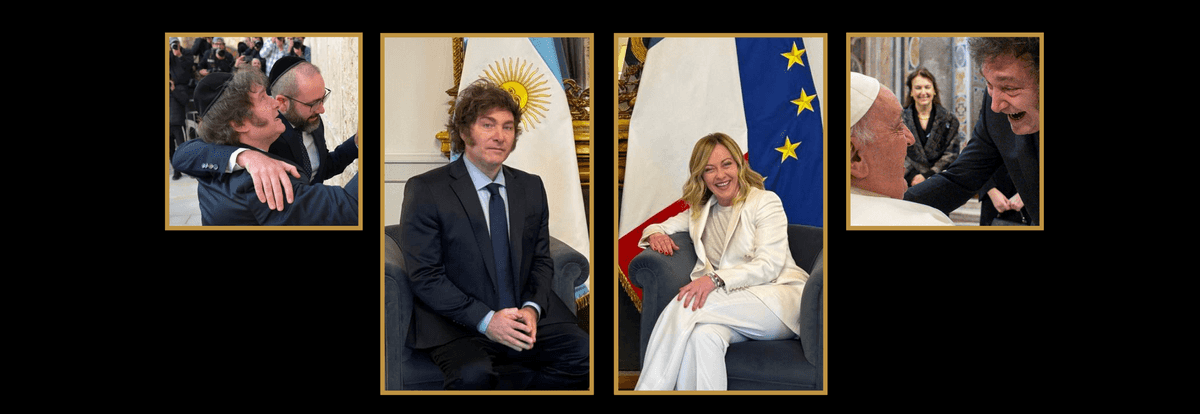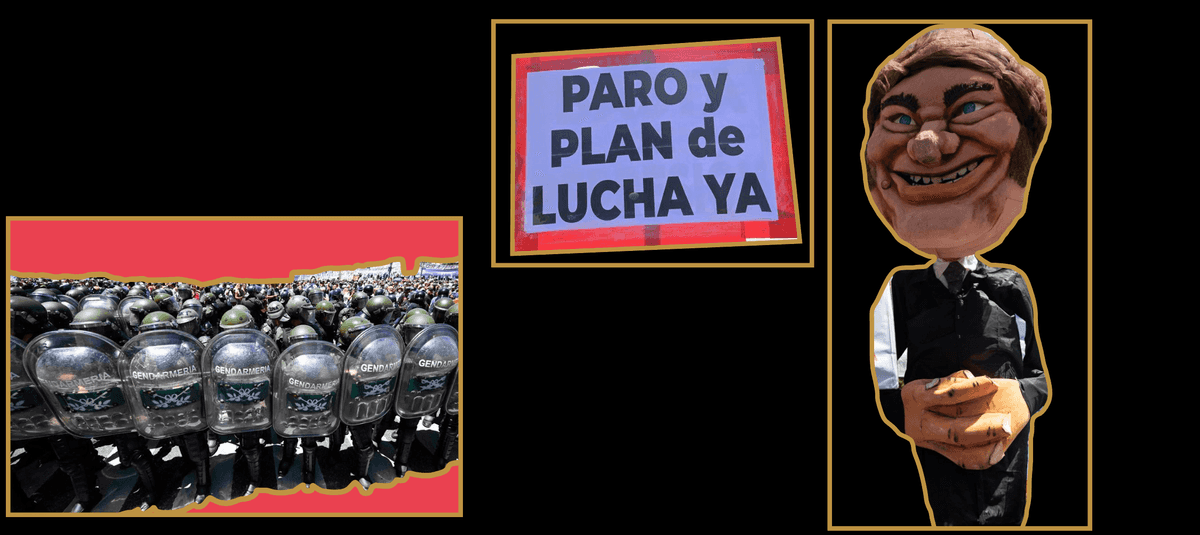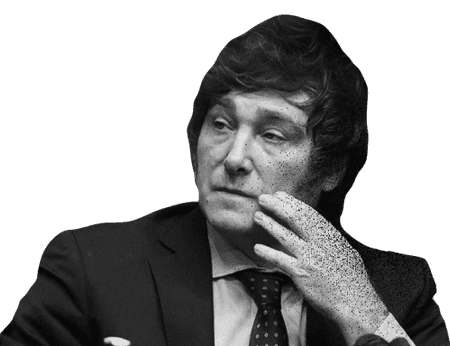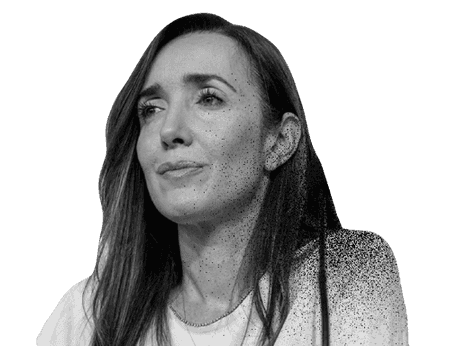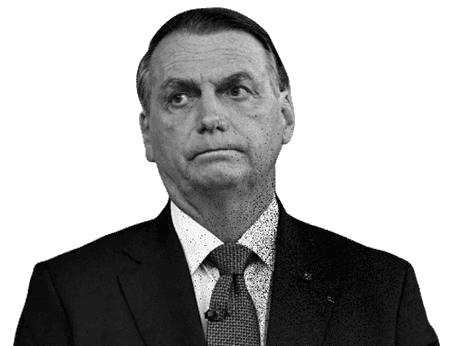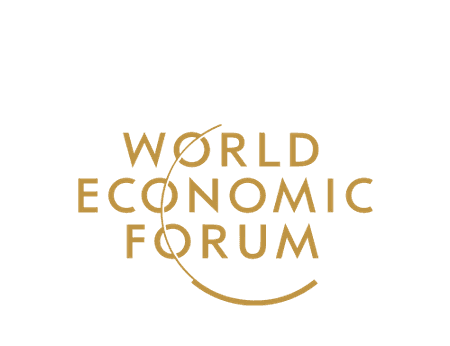Milei at Davos
Javier Milei, the new right-wing libertarian President of Argentina, spoke at Davos, Switzerland on January 17, 2024 for the annual summit of the World Economic Forum (WEF). Since its establishment in the 1970s, the WEF and its summit at Davos have been centerpieces of the world capitalist system, bringing together business leaders, economists, and politicians to socialize and discuss how to maintain the capitalist world order — with them at the top.
Milei’s speech1 broke that atmosphere with his first sentence. “I am here to tell you that the West is in danger.” This, he claimed, was because those whose job it is to defend the values of the “West” — the very people he was speaking to at Davos — had let themselves be seduced and distracted by the values of “socialism” and “poverty.” “Collectivism” was Milei’s term for the “sickness” he claimed had infected the rich and powerful. As an antidote to this sickness, Milei offered one word: “capitalism.” He closed his speech as he almost always does, excitedly choking out “¡Viva Libertad, carajo!” which might translate to English as “Freedom, motherfuckers!”
Background
Milei’s personal history has been one of his greatest political assets — he doesn’t belong to a lasting political dynasty, and unlike many Argentine politicians didn’t spend his youth rising through the ranks of a student party organization. Instead, he was born to a modest family and spent his youth in an array of different odd jobs and gigs, such as a football goalie and the frontman for a Rolling Stones cover band, before becoming an economics professor.
By the late 1980s, as Argentina’s newly reestablished democracy faced massive challenges, Milei turned his life’s focus to the world of state and corporate finance. He became particularly interested in the so-called “Austrian School” of economics, pioneered by Ludwig von Mises and Fredrick Hayek, who advocated for minimal protections for workers, the environment, and fairness in the economy. These positions would form the foundation of his politics — a belief in neoliberal fundamentalism and an indifference to the suffering it would cause common people.
Entry into Politics
Milei began his political career in 2016 during the presidency of the neoliberal politician, Mauricio Macri. He was a regular feature on Argentine television and radio, where Milei built a brand as a passionate, angry and insulting guest:2 his cursing and insensitive words regularly made the news. His flamboyant personality and crass rhetoric helped him win the hearts of disaffected youth during these televised appearances.
Milei eventually became among the most interviewed people on Argentine television.3 Branded variously as an anarcho-capitalist, an ultraliberal, or simply as an outsider, Milei’s ideology didn’t seem to fit neatly in the Argentine political system, giving him and his politics the air of something new and exciting.
Chamber of Deputies
In 2021 Milei decided to cash in on his reputation and run for the Argentine Chamber of Deputies, the country’s lower legislature. Having engaged in almost no partisan activity before this, he joined the Avanza Libertad Party which was led and founded by José Luis Espert, a journalist and economics professor. Espert founded the party in 2019 during his first bid for a congressional seat. Ultimately Milei left Espert’s Avanza Libertad and founded the similarly named Libertad Avanza Party, alongside his future vice president, Victoria Villarruel. They won seats in the national Chamber of Deputies from the City of Buenos Aires, along with several other members of their party.
In Congress, Milei attended Congressional sessions rarely; he was absent for 40% of the votes held during his tenure in the chamber.4 He proposed no legislation during his time as a Deputy and instead used it as an opportunity to remain in the limelight criticizing his fellow legislators and the Peronist government for Argentina’s ongoing economic crisis.
El Loco for President
Although a known public figure by 2023, when he announced a run for the Presidency, Milei couldn’t hold a candle to his opponents: Patricia Bulrich, former Minister of Security during the presidency of the neoliberal Mauricio Macri; and Sergio Massa, a longtime Peronist politician who at the time of the election was serving as then-President Alberto Fernandez’s Minister of the Economy.5 Milei was set up to be a spoiler for would-be Bulrich voters or at best, an also-ran. However, boosted by a debilitating inflation rate, Milei relied on bombastic tactics seeking online virality and posing with chainsaws promising to “cut” government ministries and spending. In a surprise victory6 on August 13, 2023, Milei came in first in Argentina’s mandatory open primary election, which often serves as a test run of the presidential election cycle.
Moreover, the fact that he had only recently been elected to the Argentine Congress and his party, La Libertad Avanza, was recently instituted, propelled his candidacy domestically and internationally. Prominent right-wing figures praised him for his early sign of victory, including the leaders of Spain’s VOX Party7 and the former President of Brazil, Jair Bolsonaro. The US right-wing Senator Ted Cruz suggested that he be invited to the GOP Presidential debates,8 implying that he preferred Milei to the candidates trying to position themselves against Donald Trump. It also solidified the support of the business class of Argentina, including many former allies9 of the neoliberal President Mauricio Macri. One of his largest funders was Argentine businessman Sebastián Braun, a relative of a former Macri Cabinet official. Braun’s combination of business ownership and familial political connections is an example of the class of people10 who flocked11 to Milei’s side as he became the frontrunner in the upcoming election.
Milei’s Connections
As a candidate, Milei was boosted by his connections in the world of international finance and economics. Though shunned by some in the world of Argentine finance, he received major political support from the Argentine billionaire Eduardo Eurnekian,12 whose fortune is tied up in the multinational Corporación América,13 which operates several of the largest airports in Argentina, Uruguay, and Brazil. Milei was employed by Eurnekian for over a decade and this was an important entry point for him into the world of the rich and powerful in Argentina.
Internationally, Milei and his advisors are deeply embedded in the Atlas Network,14 a global series of think tanks and political advocacy groups that have pushed for the same set of de-regulation and authoritarian policies15 from the UK to the US to Brazil. Milei has boasted of his connections with the Atlas Network for years.16 He and several of his advisors hold positions on the boards and payrolls of organizations in the Atlas Network, including the Fundación Atlas Academic Council. The Atlas Network also praised Milei for setting an international example for other extreme anti-government candidates.17
This international network has also influenced Milei’s circle of advisors. Alberto Benegas Lynch, who made a career as a climate change denier and is a member of the Atlas Network, has long been an advisor and friend of Milei’s. Others include the neoliberal Mont Pelerin Society and the Argentine economists Diana Mondino and Eduardo Filgueira Lima, both of whom were Milei allies and also members of the Atlas-affiliated Society for Liberty and Progress.18
A Right/Libertarian Coalition
But despite his “libertarian” hectoring, Milei couldn’t win in Argentina without the backing of the traditional Argentine right.
The Argentine right-wing has a long history of flirtation and affiliation with authoritarianism and violence. In the 1940s, their government openly supported the Nazi regime, and then in the 1950s, they allowed hundreds of fascists fleeing prosecution in Europe to hide in Argentina. In the 1970s, the country’s dictatorship killed some 30,000 students, leftists, and indigenous activists in what has come to be known as the “Dirty War,” all in the name of defending the “West.” When Milei used that language at Davos in 2024, he was invoking that legacy.
Milei could only win the Presidency as a third candidate by being more bombastic than his opponents and more neoliberal and right-wing than Bulrich. He had the bona fides to be the neoliberal candidate, but to entice the Argentine extreme right-wing he’d need to show that he could work with one of their own. So, he nominated Victoria Villarruel as his running mate.
Victoria Villarruel
Victoria Villarruel is known as an apologist for Argentina's history of military dictatorship. Her father, Javier Olivera Ravasi, is a prominent military commander and creator of one of the Dirty War’s most infamous detention and torture sites, “La Escuelita.”19 Villarruel spent years pushing the message that the Argentine dictatorship only engaged in violence to protect its citizens. In the Vice Presidential debate of the 2023 election, Villarruel was asked about her stance on the 30,000 who were killed — “disappeared” — by the military regime, and she responded with, “What 30,000?”20
Villaruel attends a particular sect of the Catholic Church called the Society of St. Pius X, a group of dissident Catholics led by right-wing priests who defend, among other things, “the traditional family unit and life from the moment of conception.”21 Her church conducts Mass in Latin and has been affiliated with anti-Semitic priests, some of whom even deny the Holocaust. The Argentine dictatorship that Villarruel has spent her career defending was among the most deadly anti-Semetic governments since the Nazis, vastly disproportionately targetting Jewish citizens for arrest, torture, and execution.
Villarruel is opposed to abortion (a political position she and Milei agree on) and queer rights, such as education about queer issues for the youth (something she and Milei disagree on). With her participation in the campaign, Milei once again positioned himself as an outsider to the governing Peronists, winning votes from a substantial portion of the Argentine population. Additionally, as a signatory of the Carta de Madrid, a manifesto that unites international right-wing forces from Europe to the Americas, Villarruel also provided Milei with international right-wing connections.
International Attention
Milei’s success in the polls and the primary led to international attention for his candidacy. Financial Times and The New York Times hailed him as the front-runner for the Presidency while CNN’s writeup of his primary victory pitted him as an outsider fighting against an entrenched political elite.22 The Economist’s interview noted that he wanted to make Argentina “great again,”23 echoing the rhetoric of former US President Donald Trump. Other publications noted supposed similarities between him and Bolsonaro, even though while Milei had only been in politics for two years, Bolsonaro had been in the Brazilian Congress for several decades and had a large, well-established political base.
One of Milei’s big breaks was an interview with international right-wing provocateur and former Fox News host Tucker Carlson, who traveled to Argentina to speak with Milei late in the election cycle.24 In their interview, Milei praised former US President Donald Trump and reiterated his standard talking points: praising unfettered capitalism, denouncing the left as diseased and failed, and arguing that the right-wing needed to defend the West from “collectivism.”
Election
Though Milei was polling well, it was expected that he would eventually lose to either the Peronist or neoliberal candidate in the final vote. This assumption was, however, incorrect.
Milei placed second in the first round of the Argentine election on October 22, 2023, with Sergio Massa in first place. This result meant that Milei would face the incumbent Peronist coalition in the second round of the vote in November. However, this also meant that he was able to seek and receive the endorsement of his former opponent, Patricia Bulrich, as well as former neoliberal President Mauricio Macri. These and other endorsements gained him the support he needed to defeat Massa in the second round of the vote, winning by 12%, a landslide in Argentine politics where elections are often decided by very thin margins.
Many voters thought that Mliei and his coalition would moderate when in power, representing an alternative to Peronist populism that would bring some new blood to Argentine politics. Instead, Milei’s policies were a radical, even violent, transformation of the Argentine social and political system.
Inauguration
Milei and Villarruel were inaugurated on December 10, 2023. The ceremony was attended by Hungarian Prime Minister Victor Orban, Eduardo and Flávio Bolsonaro (sons of the former President of Brazil, Jair Bolsonaro), Chilean right-wing leader José Antonio Kast, and Santiago Abascal, the leader of Spain’s right-wing Vox Party. A new Argentine Congress took office the same day, one that is nominally led by the President’s party but which relies on the support of the neoliberal and centrist parties to pass legislation as the Peronists are still the largest party in both the Senate and Chamber of Deputies. Milei’s government is a coalition of his own extreme libertarian forces, the social right-wing represented by his Vice President Villarruel, and occasional support from other political parties.
Part of his coalition building meant granting Bulrich, his former Presidential election opponent, an important position as Minister for Security. The other Cabinet posts were divided among members of his own Libertad Avanza Party, the neoliberal coalition, and a few independent politicians as well as one member of the centrist Union Civica Radical Party, which is currently in coalition with the neoliberal party.
The extreme libertarian part of Milei’s coalition had much to celebrate when he constructed his cabinet. Fellow Atlas Network-affiliated economist Diana Mondino was made the Foreign Minister, and Eduardo Filgueira Lima was put in charge of Milei’s attack on the Argentine healthcare system. Milei gave the position of Attorney General of the Treasury (which represents the Argentine state in many legal contexts) to Rodolfo Barra, who spent his youth in the neo-fascist Tacuara movement.25
Israel, Italy, and Argentina
The first trip Milei made as President was to Israel, wearing dog tags supporting Israel’s violence in Gaza with the justification of returning captive Israelis held by Hamas.26 Mieli appeared earnestly emotional on his visit with Israeli leaders, including Prime Minister Benjamin Netanyahu. He also took the opportunity to repeat a political play of former US President Donald Trump and announce that Argentina would be moving its embassy in Israel from Tel Aviv to Jerusalem, in line with Zionist policies to claim the racially and religiously mixed city for Jewish people and Judaism. Milei also used this visit to repeat his previous suggestions of converting to Judaism, a curious idea given how deeply connected the more traditional branch of the Argentine right-wing (represented by his own Vice President, Victoria Villarruel) is to anti-Semitism.
Milei’s next stop was Italy, where he met with the first Pope from the Western Hemisphere and the first Argentine leader of the Church, Pope Francis. The two leaders had long been at loggerheads, with Milei saying on record that the Pope was “devilish” and “a socialist.”27 This meeting overshadowed his encounter with his Italian counterpart, Prime Minister Giorgia Meloni, who like the Argentine President, is the most right-wing leader her country has had in years.
El Decretazo
Immediately after taking office Milei issued a Decreto de necesidad y urgencia (DNU), the Argentine equivalent of the US President’s Executive Order. Lacking a Congressional majority, the DNU was Milei’s only option for implementing his platform. Milei’s sweeping DNU affected dozens of laws and regulations:28 it moved to the privatization of Argentine state enterprises; reduced workers’ right to strike and other benefits previously owed to Argentine workers; eliminated rent controls and government contracts; and made certain forms of protest illegal. In his efforts to transform Argentine politics and economics and his willingness to use violence to do so, Milei echoed the behavior of past right-wing governments in Latin America, including the anti-left dictatorship of Augusto Pinochet, which pushed through massive pro-capitalist reforms of the Chilean economy and enforced them through torture and murder. Needless to say, the DNU was massively popular among the international business elite, including at the IMF, which holds a massive loan to Argentina, taken out by the Macri administration.29
Aftermath
This move was quickly protested throughout Argentina, with workers, students, and human rights activists marching against the decree. The Decretazo, combined with Milei’s other policies like devaluing the Peso by 50% immediately upon taking office, meant that thousands of Argentines were left without social services they rely on for their health and safety. Protests surged throughout the country, with some calling for a general strike. In response, Milei’s government sent out the military police.30 Milei’s bill was ultimately defeated in the Argentine Congress, leaving him and his government in uncertain territory but no less convinced of the radical transformations they sought in Argentine society.31
CPAC
However, Milei continues to get attention from right-wing billionaires in the US, such as Elon Musk, who tweeted a pornographic photo featuring Milei’s speech at Davos.32 He has been retweeted and celebrated by right-wing and conservative forces around the world, has his face put on t-shirts, hats, and mugs, and even inspired some tongue-in-cheek calls for him to be cloned and fielded as the US Presidential nominee by the Republican Party. He was also invited to speak at the Conservative Political Action Committee, CPAC, which is the biggest event on the US far right.
Milei began his speech (given in Spanish with English simultaneous translation) to cheers from the crowd. He greeted them, saying “I am the lion. What a good day to make the left shake with fear!” Milei received cheers from the crowd, which occasionally broke out in chants praising him and his government. However, he spent most of his speech delivering a lecture on capitalist economics. He praised monopoly capitalism, and argued that the “corrupt political caste” was strangling his country’s economy, including a reference to Adam Smith’s nearly 250-year-old pin production hypothetical explanation of the virtues of the division of labor. Milei ended by arguing that socialism is the enemy of all free people and the need to defend the West.
Backstage, Milei met with former US President Donald Trump. The two embraced, and Trump told Milei to “Make Argentina Great Again,” echoing his slogan of right-wing transformation. Trump later praised Milei in his speech, saying “Milei is MAGA.”33
Milei’s success as a right-wing celebrity seems secure. How successful he’ll be at moving his country towards his right-wing libertarian agenda will depend on how much resistance the people of Argentina show to his plans.


